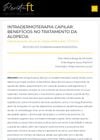5 citations,
April 2022 in “The journal of investigative dermatology/Journal of investigative dermatology” A new therapy for a skin blistering condition has not been developed yet.
 4 citations,
July 2022 in “Annals of translational medicine”
4 citations,
July 2022 in “Annals of translational medicine” Scientists created complete hair-like structures by growing mouse skin cells together in a special gel.
 1 citations,
February 2024 in “Journal of nanobiotechnology”
1 citations,
February 2024 in “Journal of nanobiotechnology” Hydrogels combined with extracellular vesicles and 3D bioprinting improve wound healing.
1 citations,
February 2024 in “Cosmetics” Cannabidiol shows promise as an effective treatment for acne.
 1 citations,
June 2023 in “Cells”
1 citations,
June 2023 in “Cells” Exosomes could be a promising way to help repair skin and treat skin disorders.
 1 citations,
February 2023 in “ACS Biomaterials Science & Engineering”
1 citations,
February 2023 in “ACS Biomaterials Science & Engineering” The new microwell device helps grow more hair stem cells that can regenerate hair.
 1 citations,
October 2022 in “International Journal of Molecular Sciences”
1 citations,
October 2022 in “International Journal of Molecular Sciences” Using healthy donor stem cells can potentially calm overactive immune cells and reduce inflammation in severe hair loss patients, offering a possible treatment method.
 1 citations,
June 2022 in “Journal of Paediatrics and Child Health”
1 citations,
June 2022 in “Journal of Paediatrics and Child Health” Young adults who had liver disease as children often experience significant health problems and frequently need transplants.

Hair intradermotherapy effectively treats hair loss and boosts self-esteem.
 November 2024 in “BMC Surgery”
November 2024 in “BMC Surgery” Follicular unit extraction is an effective and minimally invasive treatment for male hair loss.
 August 2024 in “Medicine”
August 2024 in “Medicine” Most patients with PCOS were prescribed medroxyprogesterone acetate or oral contraceptives, with some experiencing side effects or needing prescription changes.

Combining PRP with Tressfix Serum is more effective for hair regrowth in telogen effluvium than using either alone.
April 2024 in “Journal of clinical medicine” Classical PCOS types A and B are most common and linked to higher health risks.
 April 2024 in “Communications biology”
April 2024 in “Communications biology” Enzymes involved in Vitamin A metabolism affect hair growth and type in mice.
April 2024 in “Cosmetics” Microneedling improves skin and hair conditions by enhancing treatment absorption and stimulating growth factors.
 February 2024 in “Curēus”
February 2024 in “Curēus” A balanced diet with proteins, vitamins, and minerals is crucial for managing skin disorders.
February 2024 in “IntechOpen eBooks” Proper nutrition can help manage PCOS symptoms and improve overall health.
 February 2024 in “Plastic and Reconstructive Surgery – Global Open”
February 2024 in “Plastic and Reconstructive Surgery – Global Open” Stem cell therapies show promise for hair regrowth in androgenetic alopecia.
 October 2023 in “International journal of women’s dermatology”
October 2023 in “International journal of women’s dermatology” Hair camouflage methods like wigs and extensions can help Black women with alopecia feel better but may also damage hair if not used carefully.
 September 2023 in “JPRAS Open”
September 2023 in “JPRAS Open” Botulinum Toxin A may help with hair growth and has some side effects; more research is needed.
8 citations,
October 2020 in “Stem cell research & therapy” DNMT1 helps turn hair follicle stem cells into fat cells by blocking a specific microRNA.
December 2023 in “Frontiers in Medicine” Hair samples can reliably monitor tacrolimus levels in kidney transplant patients.
133 citations,
July 2020 in “Cells” Creating fully functional artificial skin for chronic wounds is still very challenging.
1 citations,
January 2024 in “Journal of personalized medicine” Hormonal imbalances during menopause may significantly contribute to Frontal Fibrosing Alopecia.
1 citations,
October 2023 in “Journal of personalized medicine” Food intake, not genetics, affects how the body processes tadalafil and finasteride.
June 2023 in “Journal of personalized medicine” Androgen treatment with dihydrotestosterone may help maintain height in patients with 5-α-reductase type 2 deficiency, especially before puberty.
 70 citations,
July 2020 in “Pharmacological Reports”
70 citations,
July 2020 in “Pharmacological Reports” Cepharanthine, a Japanese hair loss drug, shows promise as a COVID-19 treatment but needs more testing.
 20 citations,
February 2017 in “International Journal of Dermatology”
20 citations,
February 2017 in “International Journal of Dermatology” Platelet-based therapies using a patient's own blood show promise for skin and hair regeneration but require more research for confirmation.
 4 citations,
June 2002 in “Clinical and experimental dermatology”
4 citations,
June 2002 in “Clinical and experimental dermatology” Effective treatment for hidradenitis suppurativa varies, with antibiotics commonly used and surgery as an option, but no single method is universally successful.
 2 citations,
January 2018 in “Elsevier eBooks”
2 citations,
January 2018 in “Elsevier eBooks” Targeted therapies for lung cancer are effective but require careful management of side effects to benefit patients.


















